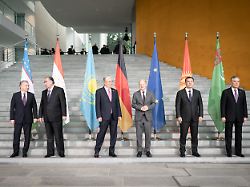In China and Russia’s shadow
Scholz agrees closer partnership with Central Asian countries
September 29, 2023, 8:19 p.m
Listen to article
This audio version was artificially generated. More info | Send feedback
Central Asian countries such as Kazakhstan and Uzbekistan are geographically located between the superpowers Russia and China. Chancellor Scholz wants to deepen relations with the region. In Berlin he concludes a pact with five heads of state.
At their meeting with Chancellor Olaf Scholz, the heads of state of the five Central Asian states welcomed the rapprochement with the EU and agreed to closer cooperation with Germany. In a joint statement released earlier in the evening, the leaders of Kazakhstan, Kyrgyzstan, Tajikistan, Turkmenistan and Uzbekistan underlined the “importance of the EU’s strategy for Central Asia, with its focus on resilience, prosperity and regional cooperation.” Without explicitly mentioning the Russian attack on Ukraine, the leaders of the former Soviet republics also emphasized the importance of sovereignty and territorial integrity and, among other things, respect for international law.
According to the statement, Scholz and the Central Asian heads of state agreed to strengthen relations between Germany and the five countries, particularly in the areas of the economy, energy supply and raw materials, climate protection and regional cooperation – and to expand contacts between citizens of the respective countries. For this purpose, a strategic regional partnership was founded.
Competition for China’s “New Silk Road”
Scholz therefore expressed his support for the efforts of the Central Asian states to further develop “regional cooperation” with the aim of “ensuring prosperity, peace, security and stability, sustainable development and good-neighborly relations between the states in the region.”
According to the statement, the heads of state found words of praise for the “Global Gateway” initiative, with which the EU wants to mobilize several hundred billion euros internationally for public infrastructure and services of general interest and to compete with China’s “New Silk Road”.
The five largely authoritarian Central Asian republics of Kazakhstan, Uzbekistan, Turkmenistan, Kyrgyzstan and Tajikistan lie between the two regional power centers of Russia and China, with which they maintain close contacts. Some of the states are suspected of helping Russia evade international sanctions.
Next summit next year
Without mentioning Russia’s war of aggression against Ukraine, the Central Asian heads of state repeatedly referred to the importance of independence, sovereignty and territorial integrity of “all states” in the declaration. They are determined to “work together for peace, security, democracy, the rule of law and sustainable development in full respect of international law,” it said. It is also important to have a “close exchange” about the “sanctions regulations” and “further efforts to prevent sanctions evasion”.
The meeting with Scholz in Berlin was the first summit between the five countries and the government of an EU state. According to the joint statement, all participants agreed to hold the next such meeting with the Chancellor in Central Asia next year. According to the joint declaration, cooperation should also be strengthened on migration. “Possible partnerships” could concern both regular migration and the readmission of migrants.
On the sidelines of the summit with Scholz, Kyrgyz President Sadyr Japarov signed a declaration of intent for closer cooperation with the federal government on migration issues. As the Federal Ministry of the Interior announced, the agreement is intended to open up avenues for the immigration of skilled workers from Kyrgyzstan and at the same time oblige the country to take back citizens without the right to remain in Germany. In the final declaration after the meeting with the five Central Asian heads of state, Chancellor Scholz also referred to a similar declaration of intent with Uzbekistan.
